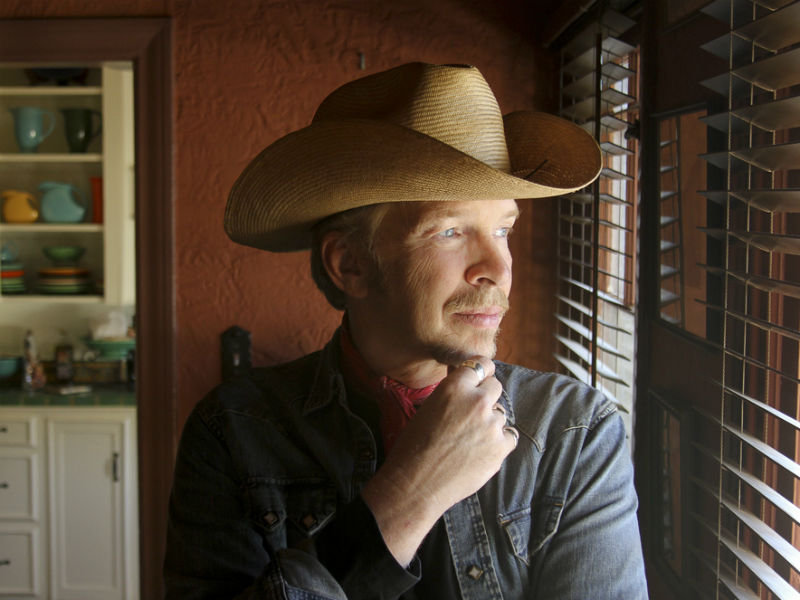Singer-songwriter and guitarist Dave Alvin doesn’t sell millions of albums, and the times he played basketball arenas or baseball stadiums are far outweighed by the countless gigs at outdoor festivals and small music clubs. But he hit a solid home run early in his career fronting The Blasters, a high-energy retro-rock band that delivered memorable performances at Summerfest in 1984 and 1986. Ten years later, Quentin Tarantino laid the group’s haunting track "Dark Night" over the opening credits of the horror-comedy "From Dusk ‘Til Dawn."
In the meantime, Alvin put The Blasters on the back burner so he could record a series of solo albums that allowed him the freedom to delve into his own musical roots. At the same time, collaborations with the seminal Los Angeles alt rock band X, punk rockers The Flash Eaters, and rockabilly singer Sonny Burgess were just a few of his trips down the blues-rock-folk-country rabbit hole.
His recent albums include a return to his rock roots, "Eleven-Eleven," as well as "Common Ground," a Big Bill Broonzy tribute. With all that history and music in tow, Alvin will appear with his band at Shank Hall on Thursday, March 17 at 8 p.m. Before then, OnMilwaukee chatted with the music industry veteran.
OnMilwaukee: In 2011, 32 years after you founded The Blasters, Rolling Stone magazine called you "an under-recognized guitar hero." What took them so long?
Dave Alvin: (laughs) It’s nice. I won’t turn that down. But understand that I’ve had real guitar players hand me my head and say, ‘Here you go!’ The best I can do is get up in the morning and think, ‘Hey, I don’t suck.’ Then I think of someone like Richard Thompson, who’s light years ahead of me. Or Jimi Hendrix. I saw him when I was 12 years old. Now THAT was a guitar hero!
Besides fronting your own bands, you’ve carved out niches as a poet, film actor and a producer of other peoples’ music.
I’m one of those jack of all trades, and probably a master of none. I don’t know about that other stuff, but I think I’m a pretty decent songwriter. As far as producing records for other musicians, I enjoy doing it. Probably the best thing I bring to the table is that I know when the band plays the right notes.
Leaving the success of The Blasters to do smaller, more personal albums was a courageous move. A lot of musicians might not take that risk.
You’re absolutely right. But I don’t want to be stuck in some one-dimensional time capsule. At the end of the day, I’m just an old blues guy. To me, it doesn’t matter if I’m sitting down playing acoustic guitar or if I’m jumping around playing electric. The way I see it, all music is connected.
A lot of David Bowie’s fans didn’t like the changes. They just wanted him to be Ziggy Stardust forever.
Yeah, I get that. A lot of people were disgruntled when The Blasters went into hibernation. But the fans aren’t always going to be with you. They come and go, and hopefully at some point they come back. As for me, I want to be all I can be. I think it’s perfectly OK not to do the same thing over and over.
You did about a year playing lead guitar for X. Was that one of those ‘It seemed like a good idea at the time’ experiences?
Pretty close to that, yeah. John Doe and Exene Cervenka were in The Knitters with me, so when they asked me to join their band, it seemed like a natural move. There was a lot of Chuck Berry and Gene Vincent in what they were doing, so it wasn’t really that big a stretch for me.
It’s great to see you up close in a place like Shank Hall, but on the business side, how can the smaller gigs even begin to offset the cost of being on the road?
(laughs) That’s a great question! The answer is simple: You keep the expenses way down! I’ve been doing this for 35 years, and the trick is not to spend all the money on stuff that doesn’t matter. I’m very lucky because I’m in the 10 percent of musicians who can make a living playing music. The other 90 percent have to hold day jobs, like teaching school or driving a truck. I’ve been extremely lucky. Less than one tenth of one percent of musicians working can afford to live the high life on the road. The Stones, Springsteen, Katy Perry, people like that. The rest of us eat at Popeye’s.







